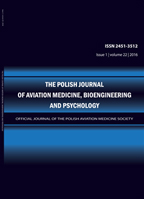2020, Volume 26, Issue 1
AUTONOMIC DYSFUNCTION IN EXTREME OBESITY
EWELINA ZAWADZKA-BARTCZAK1, DAGMARA BARTCZAK-SZERMER2
-------------------------------------------------------------------------------------------------
1Department of Internal Disease, Military Institute of Aviation Medicine
2Faculty of Medicine, Lazarski University
Autor korenspondencyjny: EWELINA ZAWADZKA-BARTCZAK; Department of Internal Disease, Military Institute of Aviation Medicine; email: ezawadzka@wiml.waw.pl
Full text
Streszczenie
Abstract: Heart rate variability (HRV) provides valuable information in various clinical settings. Limited information exists on changes in cardiac autonomic modulation in extremely obese patients (BMI>40). The aim of this study was to investigate the influence of extreme (morbid) obesity and concomitant diseases on cardiovascular autonomic function. Participants of this study are 40 women and 40 men in mean age 47,9 years old diagnosed with morbid obesity (mean BMI 47,49) and hospitalized to further bariatric treatment. In 42 patients diagnosed with hypertension (treated with beta blockers and ACE inhibitors along with well controlled blood pressure), type 2 diabetes (treatment with the oral drugs) also occurred. Furthermore, 46 patients were diagnosed with depression. None of the participants used antidepressants or sedative agents. Total of 80 healthy (40 women and 40 men) in mean age 42,7 years old and with mean BMI 24,6 were formed in group of controls. All of patients had 24-hour ECG monitoring with Holter method in order to evaluate the autonomic activity with time and frequency domain analysis (heart rate variability - HRV).
Results: Obese group showed a significant reduction of parasympathetic activity and a significant increase in sympathetic activity. No significant differences in cardiac autonomic modulation were noted between the Hypertensive-Diabetic patients and those, only with morbid obesity. However, in studied group, obese patients with depression had lower time and frequency domain parameters (p<0.05) except SDNN, SDANN and LF/HF ratio in contrast to obese non-depressive individuals. Additional load of diabetes and hypertension in depressed patients did not affect the cardiac autonomic modulation differences. Further prospective study can be undertaken within the same subjects to evaluate the effect of weight loss on the cardiac autonomic activity.
Conclusions:
1. Extreme obesity altered cardiac autonomic activity independently of hypertension and diabetes.
2. Depression associated with morbid obesity intensified HRV reduction.
Słowa kluczowe
heart rate variability, obesity, concomitant diseases
